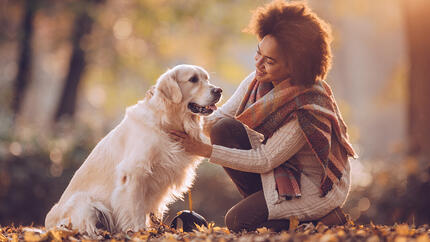
No dog owner wants to think about putting a dog to sleep, but it’s a decision that you may find yourself making towards the end of your dog’s life.
Although heart breaking, dog euthanasia is sometimes the kindest option for your canine companion. It’s never easy having to put your dog to sleep, but planning in advance and doing your research before the sad day arrives may help you be prepared and understand it all a little better.
When should you consider putting a dog down
How do you know when to put your dog to sleep? It’s the decision no one ever wants to make, but if your dog’s quality of life is suffering with no signs of getting better, you may find the kindest option is to put your dog to sleep. It’s a very hard choice; on the one hand you want to spend as long as possible with your dog, but on the other hand, you want to make the right decision for them and spare them suffering.
You will normally have a bit of time to think things through, and we always recommend you talk to family and friends and consult your vet as part of the process. Whilst you and your family will be able to tell if your dog is acting out of character or seems to be struggling with day-to-day life, your vet will have a good insight into how this will affect their quality of life. Consider the following:
- Mobility: look for signs of pain or discomfort when they move. Do they whimper or cry when you touch certain areas?
- Appetite: monitor their food and water intake closely.
- Breathing: listen for any laboured or rapid breathing.
- Comfort: check for itching, scratching, and any changes to their coat. Monitor sleeping patterns closely, too.
- Toileting Habits: observe any changes in urination or defecation patterns.
- Mental Capacity: assess their responsiveness and look for any signs of anxiety or confusion.
- Happiness: observe their overall demeanour and enjoyment of their usual activities.
- Response to Treatment: Monitor their progress and discuss any concerns with your vet.
If you see a significant decline in any of these areas, it's important to discuss your dog's condition with your vet. There may be treatment options available that could improve their quality of life and keep them happy and comfortable for longer that they can discuss with you, or they can give you realistic and objective advice on whether euthanasia is the kindest option.
Ultimately, the decision to put your dog to sleep will be yours but remember that sometimes the kindest and most responsible decision is to let them go, especially if carrying on will entail a life of continuous suffering for them.
Deciding to put your dog to sleep is hard for the whole family, especially children. If you can, try to sit down as a family and discuss the decision together, being honest about your reasons and what it will mean for everyone, including your beloved pet. Of course, it will be an upsetting conversation, and there may be tears, but try to focus on the decision of what’s best for your dog – after all, all you want to do is the right and kindest thing for your beloved canine companion.
In the days and weeks that follow from the loss of your dog, try to focus on the good times - all those wonderful walks, the games you played and the happiness you gave each other.
What happens when your dog is put to sleep: What does dog euthanasia involve?
There’s a good reason why dog euthanasia is also known as 'putting a dog to sleep' or ‘end of life for dogs’. It is a very peaceful procedure, and will help them to pass away with as little pain and distress as possible.
Sedation is commonly used prior to euthanasia – and this is something to discuss with your vet beforehand. It relaxes the dog and reduces stress or anxiety and can make the procedure more peaceful – for both dog and owner.
The euthanasia drug is usually given through a vein in the dog’s front leg, and your vet may put a ‘line’ or catheter into the vein first.
Your vet will administer a measured overdose of a drug, similar to an anaesthetic, which will put your dog into a deep and permanent ‘sleep.’
There will usually be a veterinary nurse in the room to help the vet, and you should also be able to stay throughout if you like, to stroke or cuddle your dog as they drift off.
It doesn’t take long for them to gently slip away and, most importantly, they shouldn’t suffer any pain.
Depending on the circumstances, dog euthanasia at home could be an option, in which case the vet will travel to your house and perform the procedure there. This has the benefit that your dog will feel more relaxed at home but it can leave you with lasting sad memories in that location.
Preparing yourself and your dog
Once the difficult decision of putting your dog down has been made, it’s natural to feel a range of emotions, making it important to allow yourself time to process these feelings and to seek support from loved ones or support groups if needed.
Preparing your dog for their final journey can be equally challenging. While it might seem counterintuitive to prepare your dog for something so final, creating a calm and comforting environment can help to ease their anxiety. Here’s some more ideas to try out if you find yourself in this position:
- Spend quality time: make the most of the time you have left together. Engage in your dog's favourite activities, offer extra cuddles, favourite treats, and simply enjoy their company.
- Create a peaceful environment: reduce loud noises or excessive activity. A quiet space can be comforting for your dog.
- Consult your vet: discuss any concerns or questions you may have about the procedure. Your vet can provide guidance on how to best prepare your dog and address any fears or uncertainties you may be experiencing.
- Scheduling an appointment: ask your vet for an appointment when the practice will be quiet and peaceful – and when you can take as much time as you need.
- Have a plan: decide in advance what you are going to do with your dog after euthanasia. Your vet will be able to arrange cremation – either with other pets or individual – or you might want to arrange your own bespoke cremation. If this is the case, contact the company who are going to do this beforehand and they can arrange collection.
Remember, every dog and owner are unique. What works for one may not work for another. The most important thing is to focus on providing comfort and reassurance during this difficult time.
After saying goodbye to your dog
You have many choices about what happens after your dog has been put to sleep and how to say goodbye to your dog, and again, this is a decision that you may wish to make as a family.
If you have the space and own your own property, you can take your dog home after the procedure and bury them in your garden. More usually, however, you can arrange for them to be buried or cremated at a pet cemetery.
If you choose cremation, you can arrange this yourself or you can ask your vet to arrange it for you. If you do it thought your vet, you can ask them to have the ashes kept for you to collect and scatter or to keep yourself. There is a cost in cremating your dog and having their ashes returned to you, so ask your vet to confirm these before you make your choices.
Managing your loss
Putting your dog to sleep is heartbreaking, and losing this member of the family is bound to leave you with a sense of loss. Grieving is completely normal – you’ve just said goodbye to a much-loved companion, and everyone in the family will have their own way of handling saying goodbye.
You might choose to take some time off work, especially if you have children who are having a hard time adapting - supporting one another as a family can help the healing process. If you find yourself dwelling on putting your dog to sleep, remember that it was the kindest decision for them. You helped to relieve their suffering and free them from a poor quality of life. What’s more, you allowed them to pass away painlessly and with dignity. You made a difficult but responsible and selfless decision and showed your dog the ultimate kindness in their time of need.
If you have other pets in the family, you may notice their behaviour change – they may search for your dog or whimper, while there may be a change in the social dynamics of the group. No one knows if dogs can experience grief the same way humans do, but they do seem to feel a sense of loss and certainly will pick up on emotions from the rest of the family, so give them plenty of love and reassurance.
In the coming weeks, try to reflect on the beautiful times you had with your beloved dog, and on the life full of love and happiness they had with you. However overwhelming your grief may be, you can look back on an amazing friendship and remember your dog with love and pride.
For more help and advice on coping with dog euthanasia, see our article on saying goodbye.
Should I get another dog?
Getting another dog following the passing of another is a personal decision that shouldn’t be rushed. Some people can’t bear the silence of an empty home, while others need longer to come to terms with their loss.
There is no right or wrong answer, however it is best that you don’t get a new dog while your emotions are still raw - they need to be welcomed into a forward-looking, loving home. They will never replace the dog you lost but will be just as unique and special to you in their own way. You can then look forward to a future of new memories with your new dog by your side.













